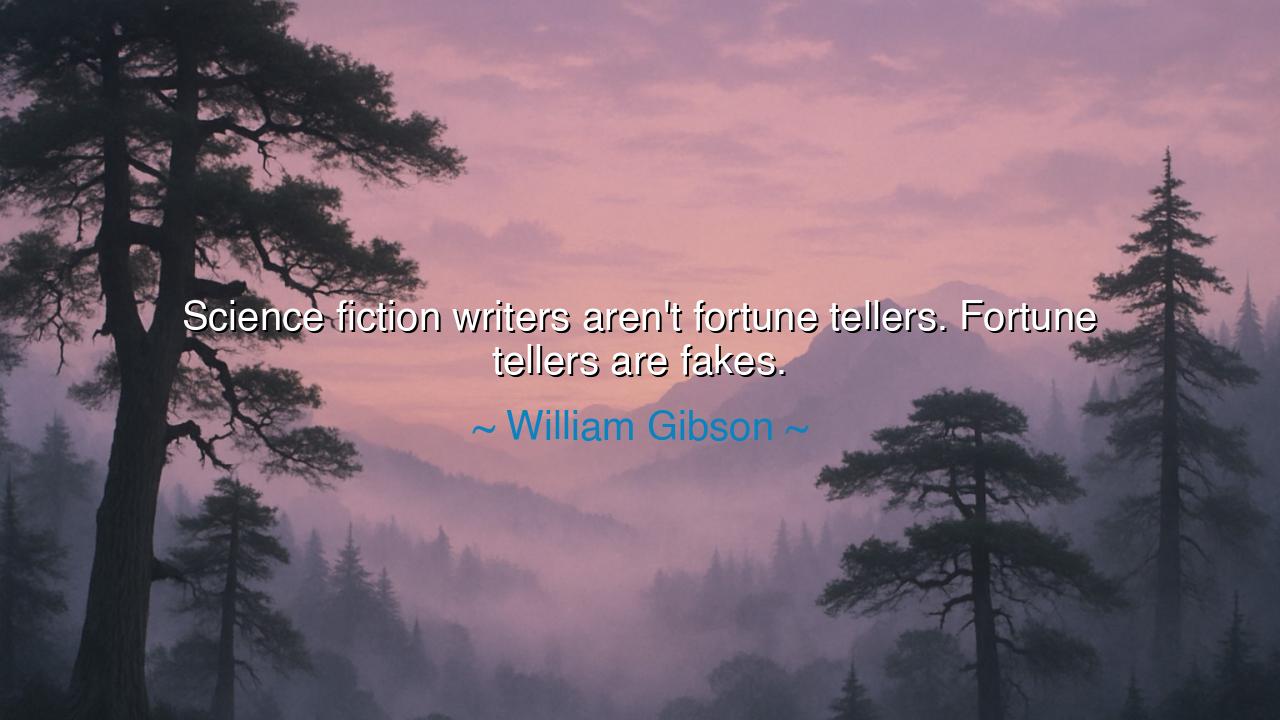
Science fiction writers aren't fortune tellers. Fortune tellers






"Science fiction writers aren't fortune tellers. Fortune tellers are fakes." With these words, William Gibson presents a sharp distinction between the imaginative and speculative worlds of science fiction and the charlatanism of those who claim to see the future. Gibson draws a line between the visionary works of science fiction writers, whose imagination draws upon current trends and scientific principles to imagine future possibilities, and the empty promises of fortune tellers, who peddle falsehoods under the guise of supernatural insight. The key to understanding this distinction is the recognition that while science fiction may explore what could be, it does so through thoughtful extrapolation and creativity, not through baseless prediction.
In the ancient world, prophecy was held in high esteem, and those who claimed to have the ability to glimpse the future, like the oracle at Delphi, were regarded with both reverence and fear. Yet, even in these times, there were those who viewed the act of fortune telling with skepticism, recognizing that human beings could never truly know the future. The Greek philosopher Socrates, for example, while respecting the oracles as part of his culture, also believed in the power of human reason and inquiry over the supposed powers of divination. In this sense, Socrates was not dismissing the potential of prophecy, but rather urging his followers to use their minds and seek knowledge through reason, not through fanciful or magical thinking. Gibson’s assertion draws on this ancient tension: the belief in human imagination and reason as the true forces that can shape the future, rather than the vague and unverifiable claims of fortune tellers.
Consider the story of Leonardo da Vinci, who in the Renaissance, used his knowledge of anatomy, engineering, and mathematics to imagine flying machines and robots long before such things were possible. Da Vinci was not claiming to predict the future; rather, he was speculating based on his understanding of the natural world and his visionary imagination. His sketches were visions of what could be, rooted in the very real world of science, not the mystical or unknown. Like Gibson’s science fiction writers, da Vinci was engaging in imaginative exploration, not divination. He understood that the future was something to be created, not foretold.
In the same way, science fiction writers like Isaac Asimov or Arthur C. Clarke engage with the world of ideas, using the tools of science, mathematics, and philosophy to envision future worlds and technologies. But their work is rooted in understanding the laws of nature and society, not in mystical or unfounded predictions. Take, for example, Asimov's Foundation series, where he explored the rise and fall of empires through the application of psychohistory, a fictional science that combined psychology and mathematics to predict large-scale societal changes. Asimov’s work was not about seeing the future but about applying rational thought to predict the trends that might shape it. This is the heart of what Gibson speaks to—the true role of science fiction is not to foretell, but to explore the possibilities of what the future might hold based on a sound understanding of the present.
Consider also the work of Mary Shelley, who imagined Frankenstein, a tale of a scientist who creates life from inanimate matter. Shelley was not predicting the future of technology or genetics but exploring the ethical and philosophical implications of scientific discovery. Today, her novel holds a mirror up to the ethical debates surrounding genetic engineering and artificial intelligence, showing how science fiction can provide us not with predictions, but with insights into the human condition and the potential consequences of our discoveries. Gibson emphasizes that, like Shelley, science fiction writers offer visions that challenge us to think about the paths we may choose and the consequences of those choices, but they are not pretending to possess supernatural knowledge of what will happen.
The lesson here is both simple and profound: we must not confuse the imaginative exploration of ideas with the mystical claims of those who seek to predict the future. Science fiction, much like the works of the ancient philosophers and thinkers, is rooted in reason, speculation, and the application of scientific principles to creative thought. It asks questions, explores possibilities, and challenges us to think critically about the future, but it does not claim to know it with certainty. The future is not something that can be predicted by those who claim to possess special knowledge. Rather, the future is something that we shape, through our actions, our understanding of the world, and our creative imagination.
In your own life, let the imagination of science fiction inspire you not to wait for the future to unfold, but to engage with it through action, inquiry, and creativity. Do not look to the so-called fortune tellers of the world—whether they are mystics or pessimists—who seek to limit your possibilities with predictions and dogma. Instead, take inspiration from the visionaries of science and art, who use their knowledge and creativity to explore and create the future. Whether in the realms of technology, ethics, or society, you have the power to shape the future by engaging with the present and imagining new ways of being. Like the great thinkers and science fiction writers before you, recognize that the future is not something to be foretold—it is something to be built, one thought, one idea, one action at a time.






AAdministratorAdministrator
Welcome, honored guests. Please leave a comment, we will respond soon